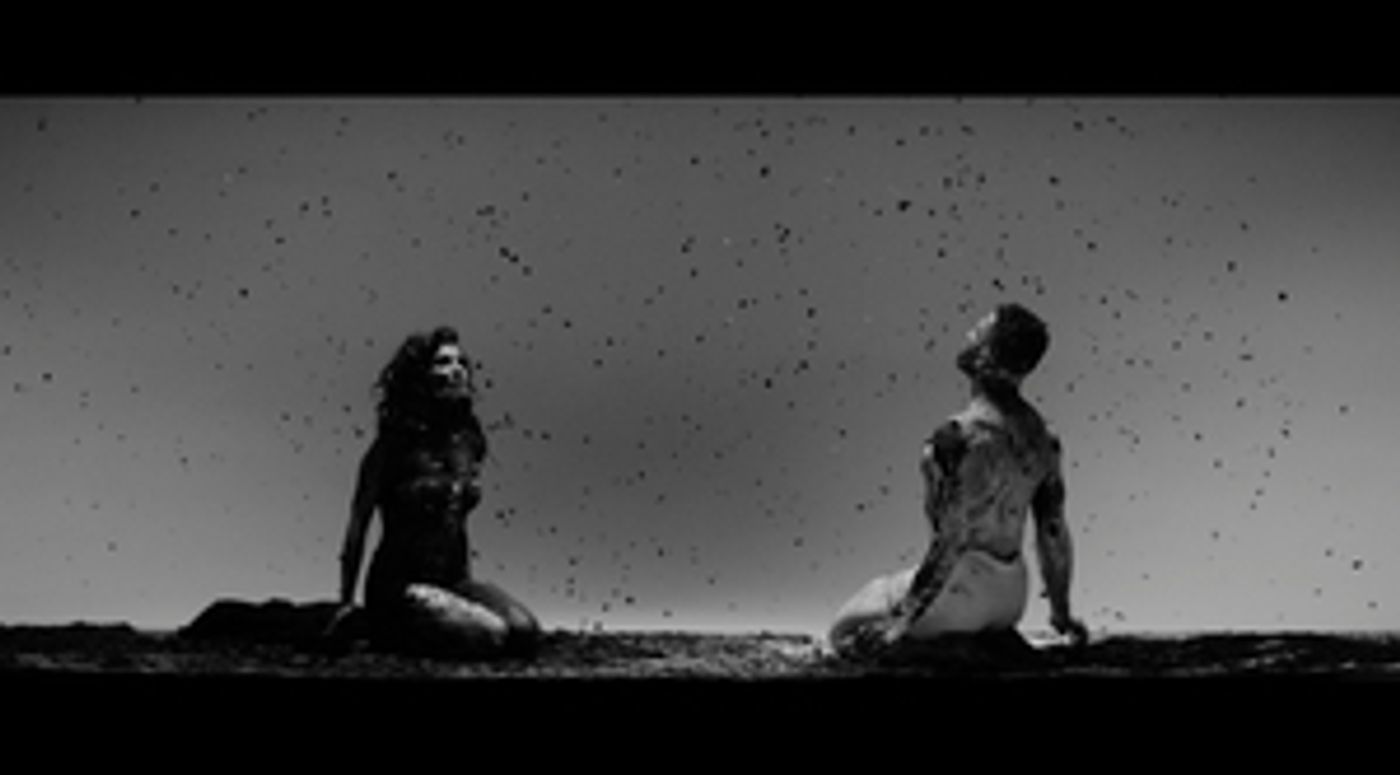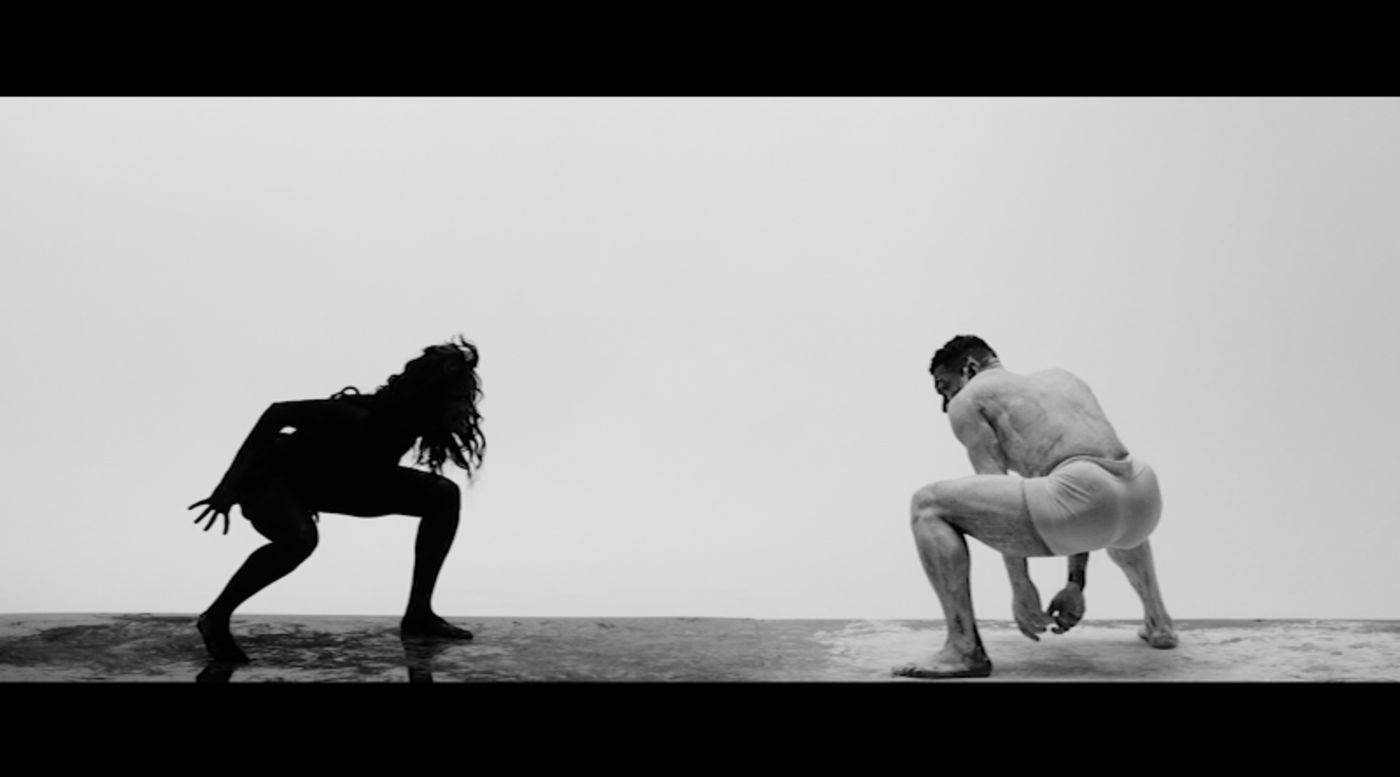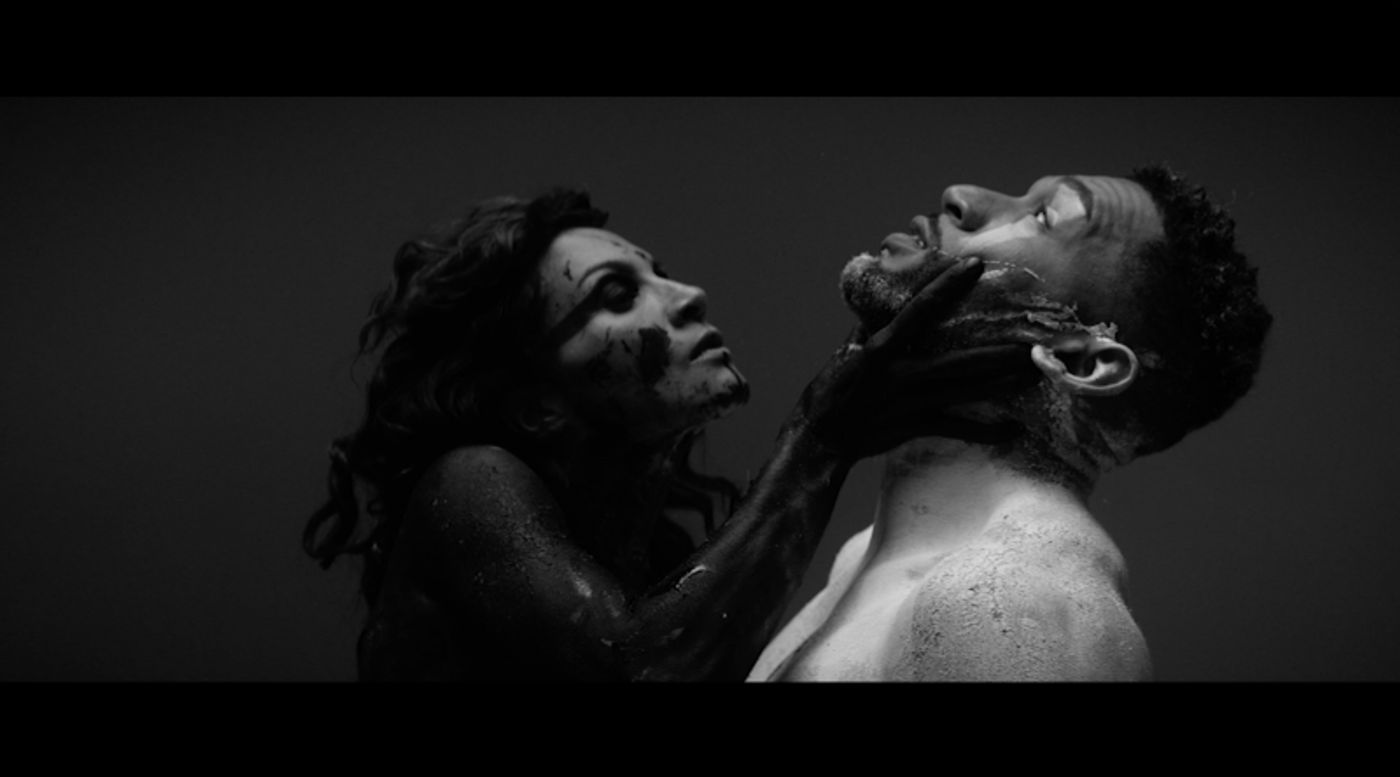Interview: Elle León Nostas Talks Oscar-Qualifying Short Film SAVIOR, Representation in the Industry & More
'Savior' recently received the 2021 Bruce Corwin Award for Best Live-Action Short Film at the Santa Barbara International Film Festival,

Elle León Nostas is the writer and director behind the short film 'Savior', which recently received the 2021 Bruce Corwin Award for Best Live-Action Short Film at the Santa Barbara International Film Festival, qualifying it for the Oscars next season.
An evocative and visually stunning film, 'Savior' plays out over some of the most well-known political speeches in American history from presidents such as Jimmy Carter and Lyndon B. Johnson, and uses dance, chiaroscuro lighting, and powerful symbolism to illustrate America's unending cycle of violence, oppression, and inequality.
'Savior' stars Anthony Velazquez and Marem Hassler, and features choreography by Ellen Kim, costume design by Laura Cristina Ortiz, and cinematography by Idan Menin.
As a Queer, Latinx, and Indigenous artist, Oroza-Nostas is passionate about championing for more representation both in front of and behind the camera, and exploring the stories of individuals and communities that are not often enough told through film.
We spoke with Elle León Nostas about the importance of representation in film, how his vision for 'Savior' came to be, what he hopes for the future within the film industry, and more.
When did you come up with this idea and how did you go about figuring out the best way to interpret your vision on film? Why was this the way you wanted to tell this story?
 This project 'Savior' reflects the cyclical nature of violence and oppression and the dehumanization of 'the other' in America as captured through political speeches from over a century. It was inspired by the unrelenting violence not only against minorities in the country, but the countless numbers of innocent black men and women who keep filling our newsfeed every day, the Pulse nightclub shooting, the Christchurch mosque shootings, the Poway synagogue shooting, the Atlanta spa shootings, Patrick Crusius when he stormed into Walmart in Texas killing 23 people, most of whom were Latinos. What does all of this have in common? It's violence against 'the other'. 'Savior' physicalizes this concept, and our team wanted to physicalize this concept as artists because what can you do? We can march, we can scream, and for us as artists, we wanted to create something that captured this never-ending cyclical nature.
This project 'Savior' reflects the cyclical nature of violence and oppression and the dehumanization of 'the other' in America as captured through political speeches from over a century. It was inspired by the unrelenting violence not only against minorities in the country, but the countless numbers of innocent black men and women who keep filling our newsfeed every day, the Pulse nightclub shooting, the Christchurch mosque shootings, the Poway synagogue shooting, the Atlanta spa shootings, Patrick Crusius when he stormed into Walmart in Texas killing 23 people, most of whom were Latinos. What does all of this have in common? It's violence against 'the other'. 'Savior' physicalizes this concept, and our team wanted to physicalize this concept as artists because what can you do? We can march, we can scream, and for us as artists, we wanted to create something that captured this never-ending cyclical nature.
And so, we put movement to music, to these speeches, that's how all of this came together. I chose political speeches intentionally because these are supposed to be our quote-unquote 'saviors' right? These are our leaders, these are the people we look to to make things better. And at the time that this was conceived I was desperate to hear the rhetoric of leadership, the sound of compassionate dialogue, I hadn't heard it in a while. And so, I looked to the most famous speeches of the past, searching for these words, and what I found was what I hoped I wouldn't find, but the truth was that nothing has changed, we've forever been here. America has always been lost in this unrelenting cycle of oppression and violence and the problems of today were the problems of yesterday.
Over half of the crew were children of immigrants - myself, my director of photography, my costume designer, the choreographer, we have these different perspectives and our feet planted in these different worlds, and we were all just trying to move the needle forward. In the dance sequences, you see this type of violence that takes place between these two individuals... I turned to both of them and I said, "You know that pain you felt as a person of color, as a minority, as a queer member of society, as a woman? Transfer that pain, that sadness, that anger that we all have and put it within our movements."
Although there was so much anger and so much sadness and so much division, there was also this bottom foundation of hope. I don't want it to be through the ashes of our own demise that we lift each other up, I want it to be through unity and conversation, meeting in the center, meeting in the middle. And that's where you see all the perspectives and begin to hope for change. It's the act of humanizing ourselves. And that's really what we were trying to target at the end.
It's a beautiful explanation of a beautiful work. What was the process like of working with your two actors in this way?
They're some of the most compassionate, incredible human beings just on their own. Anthony Velasquez is a professional dancer, choreographer, absolutely incredible the type of work that he does. Marem Hassler is an incredible actress, a champion for the LGBTQ community. I'd worked with Marem previously and loved her energy, you know somebody immediately, you know their soul and you're like, "You get this." So, she was the first person I called, and she was like, "I'm not a dancer!" and I was like, "Yes, but you're everything else! You can embody this!"
Briana Frapart, one of the producers, she brought in Ellen Kim who was our choreographer, and we all just sat and collaborated. It was, "How do we translate this feeling inside of us into movement?" We're always trying to connect and we can't do it. So, there's that moment in the film where they're trying to touch hands and they can't, and it just leads into this explosive moment where they fall backwards. All of that was conceived together as this unit of putting ourselves and our perspective into how this was going to play out. And we storyboarded the whole thing beforehand and processed exactly what we wanted the movements to evoke, but it was really playing in that space. And so, working with them was an incredible treat. We're so moved now, this win at Santa Barbara was such an amazing opportunity for us to first, of all be Oscar qualified, it's phenomenal, but it shows that people connected with it.
There's so much that didn't make it into the final cut, but they moved together, the whole crew was just standing, holding their breath as they were moving in this space, them mirroring each other, holding up their hands and looking at each other, it was so emotional. We were all so charged with all of the events that were happening and are still happening today that it was just a phenomenal experience, I'll gush about them forever.
As you just mentioned, Savior just won the 2021 Bruce Corwin Award for Best Live-Action Short Film at the Santa Barbara International Film Festival. This is an incredible honor for anybody, but how does it feel for you as someone who is Latinx, queer, an indigenous artist - whose film is illustrating the centuries of inequality, violence, and oppression in our country- to have won a top honor at this festival?
God, you're going to make me cry. Honestly, it's taken a minute to sink in I think, because my whole life I've felt like 'the other'. That's such a huge part of where this comes from, being gay, and not only from a Latin American family, but from an incredibly Catholic country, Christian country, Bolivia, and being the child of immigrants in Texas, and learning about my indigenous heritage later in life because of the incredible racism against the indigenous community in Bolivia at times.
because my whole life I've felt like 'the other'. That's such a huge part of where this comes from, being gay, and not only from a Latin American family, but from an incredibly Catholic country, Christian country, Bolivia, and being the child of immigrants in Texas, and learning about my indigenous heritage later in life because of the incredible racism against the indigenous community in Bolivia at times.
And so, how does it feel? It feels unbelievable, it feels incredible, but it's also a little bit painful because it's like, shouldn't those things not matter? But nowadays it's groundbreaking, right, when at the Oscars you see people of color winning awards and telling their stories, and it's heartbreaking because it shouldn't be groundbreaking. It should be part of our common discourse, part of our regular, everyday life. And I think after this film, it's about encouraging people to show Latinx people in every facet from romantic comedies to dramas, black men and women with incredible families and incredible lives, and rich characters, that's what we want to see, indigenous communities that are a part of our everyday life.
I'm moved, I'm so grateful for the opportunity, and to continue creating, and I hope that it just shows that it doesn't matter what your background is, if you can create something that connects with another human being, even just one human being, it erases those lines, it erases those boundaries and makes us see each other just as humans. And I think that's an important goal of my work and I hope to do that again.
What are your thoughts on the current state of the film industry in regards to representation both onscreen and behind the camera?
We're so behind. I used to be a costume designer, and I would work in film and television, and I made the final jump away from it just because I saw in the background the types of stories that were being made, the scripts that were coming across my desk from my agent. I was on set one day- and this is kind of a pinnacle moment that made me rethink everything I was doing- and I look at the casting wall, and I'm like, "Oh my gosh!" It's a predominately white cast, but I see these Latin American faces. And I'm like, "Oh my god, who are they? This is incredible! Look at the diversity! I see black and brown faces on the wall!" And it's like, Thug #1, Thug #2, Drug Dealer. And I said, "This is it. We're so much more than this." When all you do is cast us as murderers, rapists, and felons, that's the rhetoric that you're going to hear, that's what people are going to see, that's what people are going to think of us. And we're so much more than that.
We are immigrants, but we're also homemakers, we're also doctors, we're also lawyers. My parents escaped revolution to bring my sister to this country. They didn't want to leave Bolivia, but they wanted to give their daughter a chance, and they came here for her benefit so she could have a life. My sister is a psychologist, a doctor, my brother works for the president in the Biden administration, and me who's a filmmaker. We are everything, being Latinx is not a monolith, there are so many different experiences and breadths of life, and stories, and it's up to us to tell them all. People are yearning for it.
People are waking up slowly, and change is slow, but we need it. I see the scripts that get made, I see the movies that get made, and it's the same thing over and over again. And we have an opportunity to give them a lens, a new perspective to see the world through. And what does that go back to? Eliminating that line of 'the other'. Seeing each other as equals. And then it won't be a surprise when we see that there is a gay Latin lead, it won't be a surprise when people of color, and indigenous people, and Asian people, and queer people are winning awards and telling their stories, it will just be like, "Great, that was an amazing movie."
In short, we have a long way to go, and I hope that I can be a part of that change, and I hope that I can lift others up. I've had amazing mentors who have come to me and are helping lift me up. We need to give opportunities to first-time filmmakers, we need to give opportunities to young costume designers who can't break in because of their accents. We need to help each other. And it's happening. It's slowly happening, but I hope that it happens faster.
What can you tell me about what your future projects will look like? Do you have an idea of what you'd like to take on, or concepts that you would like to tackle?
Yes, I have a breadth of stories I'd like to tackle. One of the features I'm so ready to make is actually inspired by the true story of a woman named Juana Mayta, a trans woman burned alive by 400 people in broad daylight in Bolivia. That film is called 'Casa Quemada', and it centers around three different perspectives of what happened that day. An incredibly important story which happened less than three years ago. These are the types of stories I know are incredibly important to tell because it shows that destruction of 'the other' when we need to be humanizing each other.
I have another amazing project with a writing partner called 'Ten to Midnight', which is a romantic comedy about a Latinx bisexual who has to break up with ten people before midnight to prove his love and get the one. A film called 'Mom', which is a horror-comedy about a bunch of kids and a self-driving car that murders a bunch of people. It's such a different spanning of ranges, but that's what storytelling is. Those are the types of stories I want to tell with queer characters, with Latinx characters. 'The Forgotten Lake' which is about two lovers who are looking at an apocalyptic future that we live in and trying to survive.
So many different types of stories that I want to tell, but none of them are because they are this ethnicity or because they have this sexual orientation that it's about them, they're just stories. And important stories. And stories that need to be told. For me, seeing a queer character and not having it be a coming out story - although those are incredibly important to have- but to see them just living their life. When I was six I had to wear a heart monitor because I was so terrified of the fact that I was gay and I couldn't tell anybody, I was having heart palpitations. But to see that on screen, to see it being okay? I would love to have that opportunity, through all of these stories.
One last thing I'll say is that the time when we need to be most united is now, there are so many people, indigenous communities, LGBTQ communities, communities of color, everyone is suffering from what the pandemic brought upon us. And one thing I would love to remind people of is turn to your neighbor and help them. If you can do a GoFundMe, if you can do anything to help these people in need, especially the film industry and in the theater industry... Actors and dancers create together, but help each other, because we can't do it alone. We just can't.
*This interview has been edited and condensed for clarity.
Videos

